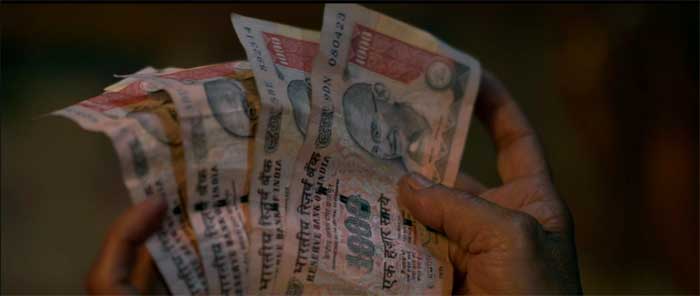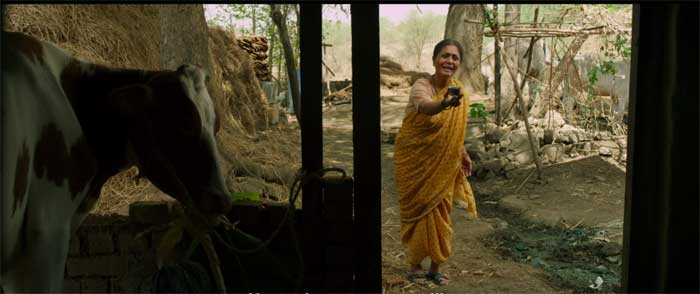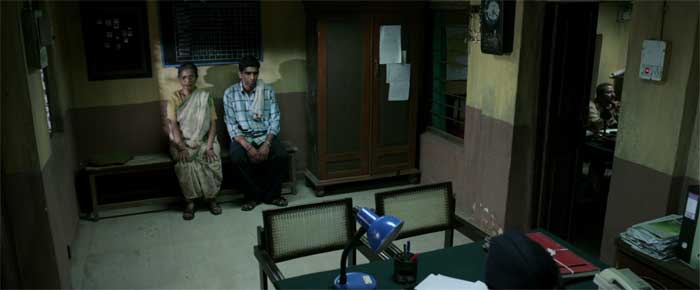1000 Rupee Note (Ek Hazarachi Note in Marathi) is an Indian film about poverty, wealth, and the corruption of power. Beware the spoilers.
I happened into a Twitter conversation with 1000 Rupee Note director Shrihari Sathe as part of a discussion about Dukhtar (Daughter). He was a producer on Dukhtar (Daughter). For 1000 Rupee Note he did triple duty as director, producer and editor. I’m glad he told me about 1000 Rupee Note, because I found it on Netflix and enjoyed it.
The story is told in a straight-forward, realistic style. We see the challenges of poverty and want facing the characters without a lot of heavy-handed moralizing.
Bodhi (Usha Naik) is a poor widow in a small village in India. Just a year ago her son committed suicide over their debts. This part of the story comes to us as flashbacks of painful memories for Bodhi. She lives alone in a tiny home attached to the home of goat-herder Sudema (Sandeep Pathak) and his wife and children. Bodhi and Sudema are great friends. She loves sharing tea and fluffy bread with him.
One evening Sudema and his family and Bodhi go to hear a politician speak. He’s passing out rupee notes and free meals to the voters. When he hears the story about Sudema’s son committing suicide (it was on the news) he gives her four 1000 rupee notes.

This is a fortune to Bodhi. Her daily expenditures are under 10 rupees. She works cleaning and doing laundry to earn that.

Everyone in the village knows about the money. Now no one wants to sell to her as they did before. Two rupees worth of milk for her tea – hard to get. The vendor of fluffy bread gives her a hard time. She’s afraid she’ll be robbed.
Bodhi knows exactly what she wants to do with the money. She wants to take a bus to a nearby town where she can replace the broken lens in her glasses. She’d like to replace the broken glass in the frame holding her son’s picture. And she wants to buy a new sari for herself and new clothes for Sudema’s whole family.
Sudema goes with her. They start with the glasses. The optometrist can’t change a 1000 rupee note, so Sudema uses all his money to pay until they get change. The man in the frame shop can’t make change either. He keeps the photo until they can come back with exactly 70 rupees. The clothing comes to 720 rupees – surely they can get change now! But the owner of the clothing store thinks the rupees are counterfeit and calls in the police.

From there on it’s a big mess. Bodhi and Sudema are held by the police, who quickly decide to spend the money on themselves. And they hatch a scheme to get even more. If the message of the film is about the corrupting influence of money and power, these police (and the politician who was buying votes) exemplify the problem perfectly. Bodhi and Sudema are held in jail. Sudema is beaten. They aren’t given any dinner.
The thing is, Bodhi and Sudema could have walked out of the building at any time, but they didn’t. The only law abiding people in the story were the ones being exploited by rich SOBs in power. Although one cop has an attack of conscience and returns one of the 1000 rupee notes, by the time Bodhi and Sudema get home they are poorer than they were before the money came into their lives. The final scene was both sad and uplifting. You know these poor peasants are going to endure, no matter what. But it’s hard, and Bodhi’s glasses got broken again by the police when they shoved her around.
Just as the woman Bodhi works for wouldn’t know how to cook a meal in Bodhi’s tiny hut, Bodhi doesn’t have any idea of how to deal with a large denomination of money. The class system is a prison for everyone. And it isn’t a problem belonging only to India, even with its history.
Usha Naik is an accomplished actress with 25 Indian films to her credit on IMDB. You can learn about her background in this interesting interview “I love working with young directors.”
Sandeep Pathak has an equally impressive listing of film credits on IMDB, although he’s a younger person. These and all the other actors performed beautifully. This was a well-written story. I think you’ll enjoy it.

Pingback: Recommended Foreign Language Films and TV Series - Old Ain't Dead